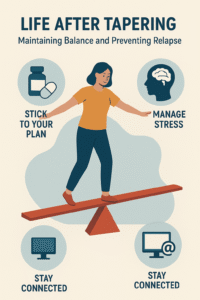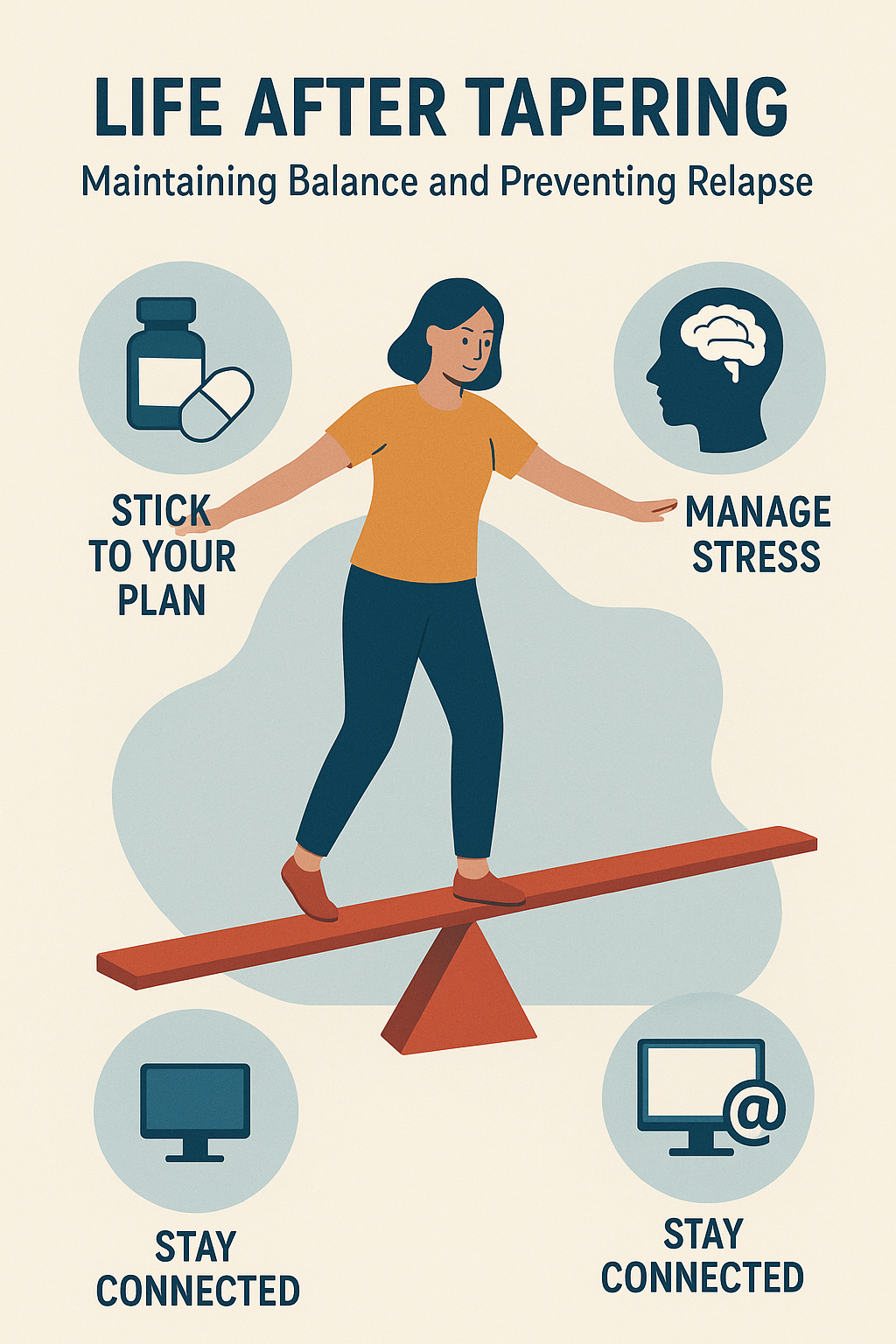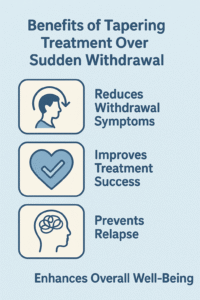Understanding Life After Tapering: What Happens Next?

Recovery doesn’t end once the tapering process is complete—it’s just the beginning of a new chapter. Life after tapering can be both liberating and challenging. While physical dependence fades, emotional resilience becomes the cornerstone of lasting sobriety. At New Soch Rehab and Psychiatric Center Islamabad, recognized as the best rehab center in Islamabad, clients are guided to embrace this transition with structure, therapy, and community support.
What Does “Tapering” Mean in Recovery?
Tapering refers to the gradual reduction of medication or substance use under professional supervision. This process minimizes withdrawal symptoms and helps the body and mind adjust to functioning without dependency. However, post-tapering life requires conscious effort—individuals must learn new coping mechanisms to replace old habits.
Emotional and Physical Challenges After Tapering
Once the tapering process concludes, many individuals face emotional turbulence such as anxiety, depression, or cravings. Physically, the body takes time to restore chemical balance. Without proper support, these challenges may lead to relapse. That’s why structured aftercare and ongoing therapy at the best rehab center in Islamabad become vital for sustained recovery.
Why Relapse Prevention Matters in Long-Term Recovery
Relapse doesn’t happen overnight—it’s a gradual process influenced by stress, emotional distress, or environmental triggers. Understanding these underlying factors helps individuals build resilience.
The Psychology Behind Relapse
Relapse is often linked to unresolved emotional pain or unaddressed mental health issues. Cognitive-behavioral therapy (CBT) and mindfulness techniques—offered at New Soch Rehab and Psychiatric Center Islamabad—help clients recognize thought patterns that may lead to relapse and replace them with healthier responses.
Common Triggers That Lead to Setbacks
Some common relapse triggers include:
-
Exposure to people or places associated with substance use
-
High levels of stress or emotional trauma
-
Overconfidence in recovery (“I can handle it”)
-
Lack of support or isolation
Recognizing these triggers is the first step toward maintaining long-term stability.
Strategies for Maintaining Balance After Tapering
Building a healthy and purposeful routine is key to sustaining recovery.
Building a Structured Daily Routine
Structure brings predictability and control. Setting daily goals, incorporating exercise, and practicing gratitude can significantly reduce the likelihood of relapse. Morning meditation or journaling helps individuals center themselves emotionally.
Importance of Counseling and Continued Therapy
Even after completing tapering, regular therapy sessions provide ongoing emotional support. The best rehab center in Islamabad, New Soch Rehab and Psychiatric Center, offers personalized counseling and psychiatric evaluation to ensure every client continues progressing toward mental well-being.
Mindfulness, Meditation, and Emotional Regulation
Mindfulness and meditation techniques empower individuals to respond rather than react to stress. Practicing self-awareness fosters calmness and mental clarity, two essential elements for relapse prevention.
The Role of Support Systems in Sustaining Sobriety
Family and Peer Support Networks
Family plays a crucial role in maintaining long-term recovery. Educating loved ones about addiction recovery helps them offer constructive emotional support instead of enabling old patterns.
How Support Groups Help Prevent Relapse
Peer support groups—both in-person and online—provide a sense of belonging. Sharing experiences with others who have faced similar struggles fosters accountability and motivation to stay sober.
Professional Guidance from the Best Rehab Center in Islamabad
How New Soch Rehab and Psychiatric Center Islamabad Empowers Recovery
At New Soch Rehab and Psychiatric Center Islamabad, clients receive comprehensive post-tapering support. The center’s holistic approach includes psychiatric care, therapy, nutrition counseling, and life skills training. The dedicated team ensures that recovery becomes a sustainable lifestyle, not just a short-term achievement.
Holistic Therapies and Aftercare Programs
The center integrates evidence-based practices such as cognitive behavioral therapy (CBT), dialectical behavior therapy (DBT), art therapy, yoga, and meditation. Tailored aftercare plans help each individual maintain emotional stability and avoid relapse triggers in real-world settings.
FAQs About Life After Tapering and Relapse Prevention
1. What’s the biggest challenge after tapering off substances?
Emotional regulation and managing stress are the biggest challenges. Continuous therapy helps navigate this phase successfully.
2. How long does it take to feel “normal” again after tapering?
Every person is different, but most people start to feel stable within a few months, especially with proper aftercare.
3. Can therapy prevent relapse completely?
While no method guarantees complete prevention, consistent therapy significantly reduces relapse risks by strengthening coping mechanisms.
4. Why is support from family important?
Family support reinforces accountability and creates a healthy emotional environment for recovery.
5. What sets New Soch Rehab apart from others in Islamabad?
Its holistic, patient-centered approach, combined with professional expertise, makes it the best rehab center in Islamabad for sustained recovery.
6. Is relapse a sign of failure?
No. Relapse is a part of the recovery journey for many. What matters most is recognizing it early and seeking professional help immediately.
Conclusion: Your Path to a Balanced and Fulfilling Life
Life after tapering is a lifelong commitment to self-growth, mindfulness, and mental wellness. With compassionate guidance from New Soch Rehab and Psychiatric Center Islamabad, individuals can embrace a new beginning filled with stability, confidence, and purpose. Remember—recovery is not just about quitting; it’s about thriving beyond addiction with the right support from the best rehab center in Islamabad.


